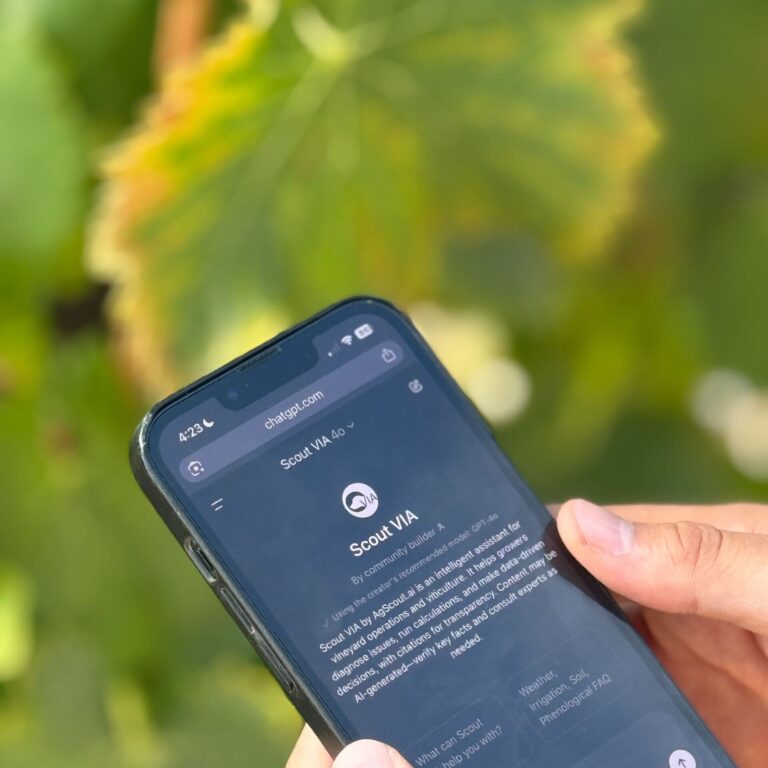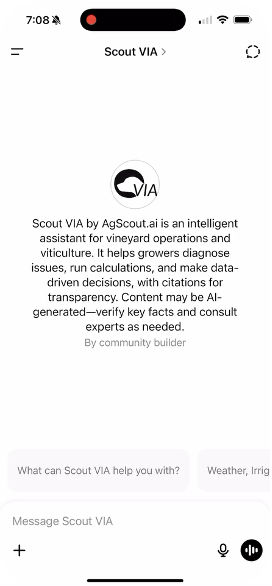Vineyard Intelligence, On Demand
ScoutVIA™ turns 650+ expert articles, field guides and public viticulture repositories into real-time, vineyard-specific answers—backed by science, not guesswork.
Available to the community free of charge.
Introducing VIA -
The Vineyard Intelligent Assistant

- Augment Human Intuition and Experience – Help smart farmers farm smarter.
- Precision over Assumptions – Replace guesswork with best practices, measurable data and peer reviewed insight.
- Grower-Centric Innovation – Built around common vineyard problems and workflows.
Modern vineyards run on data—but critical information is scattered across research papers, field guides, and tribal knowledge. Sometimes you need the information in the vineyard with you.
Scout VIA brings it all together in one place, delivering grower-friendly fast responses powered by expert knowledge—so you can diagnose symptoms, plan confidently, and apply best practices with ease.
What ScoutVIA Does

ScoutVIA is an intelligent assistant trained on an ever-growing knowledge base of:
- Field Guides & Best-Practice Manuals
- Plant Material, Clone and Rootstock Database
- Peer-Reviewed Research & Viticulture Repositories
- IPM & Sustainability Resources
- Regional Weather & Climate Data
It bridges disconnected “islands of information,” providing transparent citations so you can trust every recommendation. Our Knowledge base grows every month.
What Questions Can I Ask ScoutVIA?
Weather
- What is the best Practice for irrigation during extreme heat waves?
- Calculate GDD days in my AVA?
- What are GDD days and how do I calculate them?
- When do I start tracking phenological stages?
- Does Weather effect Red Blotch Progression?
Integrated Pest &
Disease Management (IPM)
- How do I monitor for red blotch and its vectors?
- When should I scout for Red Blotch symptoms?
- Show me a photo of a vine with Red Blotch Disease
And More
- When should I expect budbreak, bloom, veraison, and harvest in my AVA?
- What are the signs my vines are under water stress?
- What is the difference between Organic and Regenerative Farming Practices?
Request
Beta Access
Scout VIA Beta is freely available to promote viticulture knowledge and data driven decision making. Join our early-adopter community and shape the future of vineyard intelligence.
Frequently Asked Questions
What is ScoutVIA?
Scout VIA is your AI vineyard assistant, trained in viticulture and enology to support decision-making across all aspects of wine grape production. Getting started with Scout VIA is free. You don’t need to be a Scout customer to get advantage.
Is ScoutVIA accessible without an existing Scout subscription?
Yes – ScoutVia is available as a free GPT on OperAI’s ChatGPT platform.
How does ScoutVIA manage citation for sources?
ScoutVIA is engineered to provide citations for knowledge articles and published material is referenced. NOTE: All material indexed in the knowledge base are available publicly and there should not be any restricted content.
What current limitations exist, and when should a viticulturist or consultant still be consulted?
While ScoutVIA provides fast, research-backed guidance, it does not replace the need for professional judgment. Limitations include:
No physical inspection: VIA can’t see or touch your vines. For complex, overlapping symptoms or site-specific issues, in-person scouting is critical.
Evolving science: Some recommendations are based on the best available research, which may evolve. Always confirm with regional advisors when trying new practices.
Lab testing required: Diagnosing viruses, nutrient levels, or pathogens often requires lab analysis—VIA will guide when to test, but can’t do it for you.
Regulatory guidance: Always follow your AVA or state-specific regulations for restricted materials, buffer zones, or organic compliance.
When to consult a viticulturist or PCA:
If you’re planning major cultural practice changes
If symptoms persist despite VIA’s recommendations
If you need help interpreting lab results or field trials
For site-specific pest thresholds and spray timing in high-pressure years
ScoutVIA is your first line of support, not a full replacement for hands-on expertise.
Does ScoutVIA integrate directly with Scout’s existing scan reports and dashboards?
Not yet—but it’s on the roadmap.
Currently, ScoutVIA operates as a standalone intelligent assistant, offering expert guidance based on your questions, vineyard characteristics, and regional best practices.
However, integration with Scout.ai scan data and dashboards is planned, enabling future capabilities like:
Auto-contextual responses tied to your scan results
Block-specific health insights and targeted recommendations
Real-time data interpretation and trend tracking within ScoutVIA
Why Was ScoutVIA created?
ScoutVIA was created to solve a common challenge in modern vineyard management:
“There’s expert information out there—but finding the right answer at the right time, for your specific block, is slow and inconsistent.”
Growers, viticulturists, and consultants often rely on a mix of PDFs, research papers, local knowledge, and guesswork—especially during urgent field decisions.
ScoutVIA was built to:
Make expert viticulture guidance instantly accessible
Support faster, more confident decisions in the field
Reduce reliance on fragmented or outdated sources
Democratize knowledge—so every team member, from interns to vineyard managers, has access to science-backed answers
Bridge the gap between AI and boots-on-the-ground farming
By combining decades of research with natural language understanding, ScoutVIA helps you act on data, not instinct—every day of the growing season.
How does ScoutVIA differ from general-purpose AI assistants?
Unlike general-purpose AI tools, Scout VIA is purpose-built for viticulture. It’s not trained to answer everything—it’s trained to answer grape growing questions with depth, accuracy, and context.
Here’s how Scout VIA stands apart:
| Feature | Scout VIA | General AI (e.g. ChatGPT, Bard) |
|---|---|---|
| Domain Expertise | Trained exclusively on viticulture & enology | Broad/general across all topics |
| Source Transparency | Provides citations from trusted ag/viticulture sources | Often lacks source clarity or mixes fact with speculation |
| Region-Specific Guidance | Calibrated for Napa, Sonoma, Central Coast, and AVA-specific practices | Generic or globally averaged responses |
| Field-Ready Tools | Offers GDD calculators, irrigation estimates, red leaf diagnostics | Not optimized for agriculture workflows |
| Terminology Awareness | Understands vineyard-specific language and abbreviations (e.g. ETc, GLRaV, ripening stages) | May misunderstand or oversimplify viticulture terms |
| Data Sensitivity | Built with confidentiality and data protection in mind | General AI may reuse or store prompts unless carefully configured |
What are good questions to start with?
| When should I expect budbreak, bloom, veraison, and harvest in my AVA? |
| What are the signs my vines are under water stress? |
| How do I monitor for red blotch and its vectors (e.g., Spissistilus festinus)? |
| When should I scout for Red Blotch symptoms? |
| Show me a photo of a vine with Red Blotch Disease? |
| What is the difference between Organic and Regenerative Farming Practices? |
| What is the best Practice for irrigation during extreme heat waves? |
| Calculate GDD days in my AVA? |
| What are GDD days and how do i calculate them? |
| When do I start tracking phenological stages? |
| Does Weather effect Red Blotch Progression? |
Which knowledge sources power ScoutVIA’s recommendations?
ScoutVIA is built on a curated library of 650+ expert-reviewed viticulture articles, sourced from leading academic, extension, and research institutions. Key sources include:
UC IPM (University of California Integrated Pest Management) – Pest and disease identification and control strategies
UCCE (UC Cooperative Extension, especially Napa and Sonoma offices) – Regional best practices for California vineyards
AWRI (Australian Wine Research Institute) – Global research on vineyard management, disease, and nutrition
Cornell University Viticulture & Enology – Cold climate vineyard practices and virus research
UC Davis Viticulture & Enology – Academic research on grapevine physiology, irrigation, nutrition, and climate
Lodi Winegrape Commission & Napa Valley Grapegrowers – Sustainable farming guidelines and seasonal best practices
Peer-reviewed journals and viticulture field guides – Including disease decision trees, spray recommendations, and nutritional correction protocols
All recommendations are evidence-based, and many include citations and links for transparency and deeper learning.
